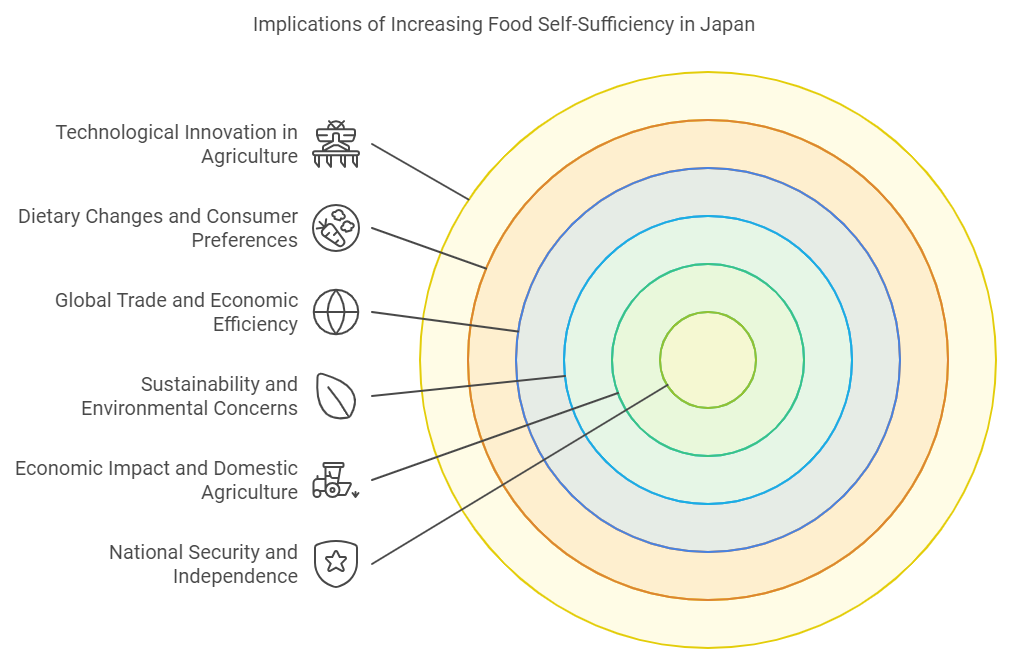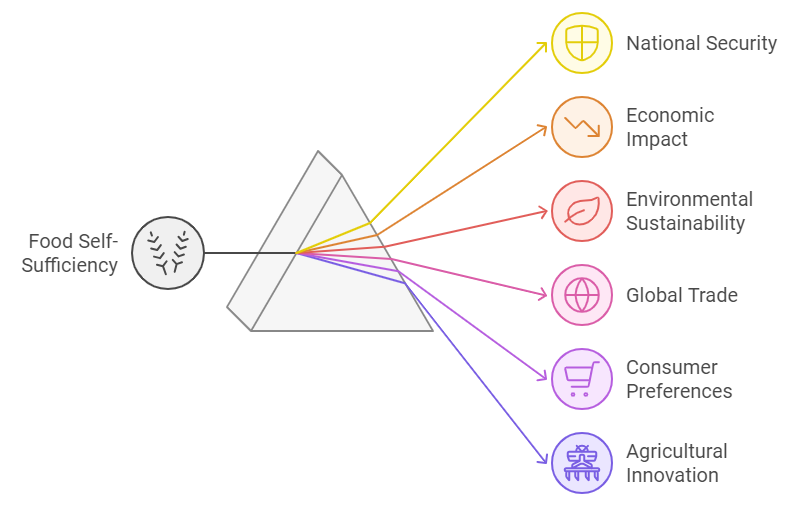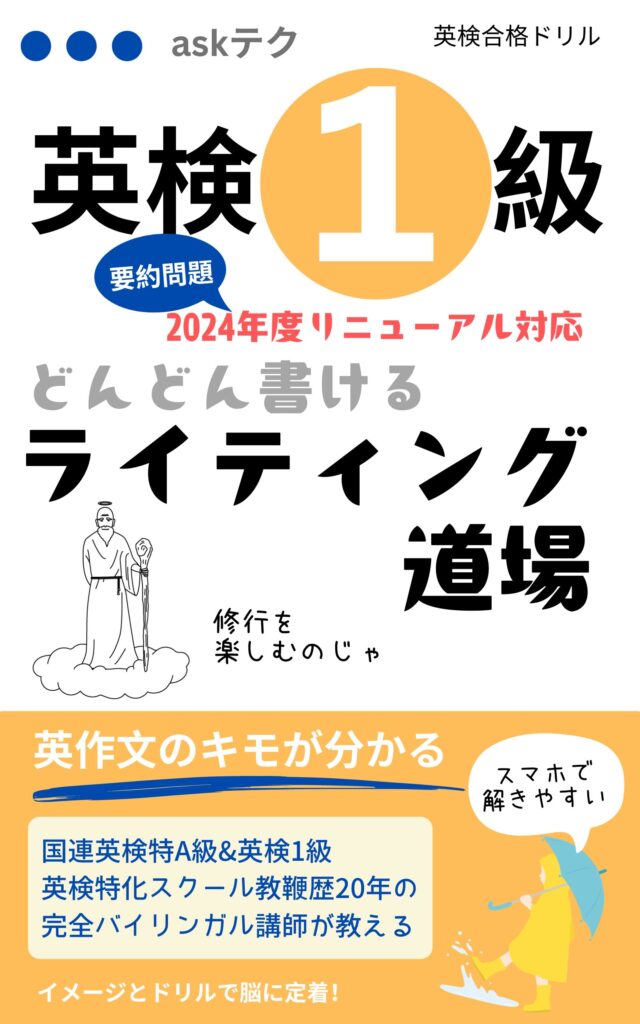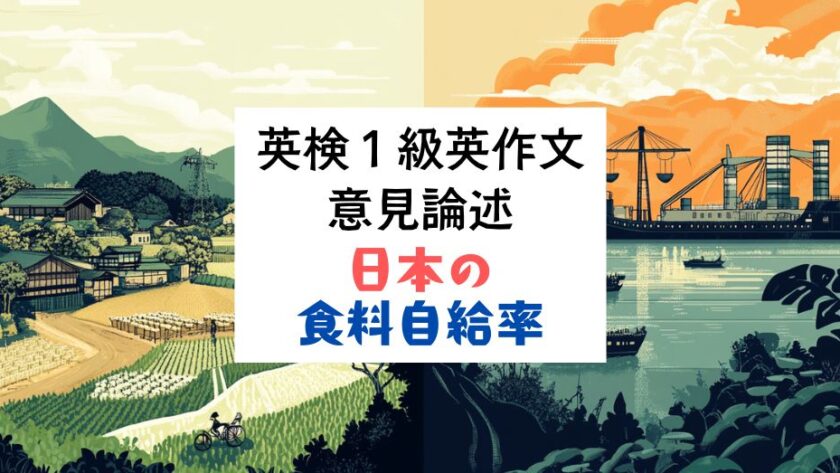(簡単★~難しい★★★★★)語彙難易度★★★
目次
Agree or Disagree; Japan should increase food self-sufficiency rate.
日本は食料自給率を上げるべきだ
トレーニング手順
- 分野・トピック毎の観点とキーワードをまとめる
以下の画像のようなイメージ図にしておくと、記憶に定着するのでおススメ - 自分が書きやすい立場・観点で実際に書く
分からない表現はすぐに調べて15分程度で書く - 続いて、先ほどとは反対意見で書いてみる
分からない表現はすぐに調べて15分程度で書く - そのトピックについて実際に誰かと話す、又は1分スピーチをする
- 同じ分野で3つくらいの意見論述を作成する
例えば、宇宙なら宇宙植民・宇宙採掘・宇宙旅行など
外国語学習観点 (Perspectives)
単純化したイラストで整理することで、記憶に定着しやすくなります。

- National Security and Independence (国家安全保障と独立性)
Increasing food self-sufficiency strengthens national security by reducing dependency on foreign imports, particularly in times of global crises or trade disruptions. - Economic Impact and Domestic Agriculture (経済的影響と国内農業)
Boosting self-sufficiency could revitalize Japan’s agriculture sector, creating jobs and supporting rural communities. - Sustainability and Environmental Concerns (持続可能性と環境問題)
Growing more food domestically may align with environmental sustainability goals by reducing carbon emissions from food transportation and encouraging eco-friendly farming practices. - Global Trade and Economic Efficiency (グローバル貿易と経済効率)
On the other hand, focusing too heavily on self-sufficiency could be less economically efficient, as Japan may need to import certain food items that are cheaper or easier to produce abroad. - Dietary Changes and Consumer Preferences (食生活の変化と消費者の嗜好)
Increasing self-sufficiency might require changes in consumer diets to accommodate more locally grown products, which may not always align with current food preferences. - Technological Innovation in Agriculture (農業における技術革新)
Investments in agricultural technology, such as vertical farming and hydroponics, could help Japan boost its self-sufficiency without requiring vast amounts of land.
キーワード (Keywords)
- food security (食料安全保障)
- self-sufficiency (自給率)
- agricultural revitalization (農業の活性化)
- rural economy (地方経済)
- environmental sustainability (環境持続可能性)
- global trade (国際貿易)
- consumer preferences (消費者の嗜好)
- technological innovation (技術革新)
- food imports (食料輸入)
- carbon footprint (カーボンフットプリント)
使われそうな動詞 (Verbs)
- enhance (強化する)
- diversify (多様化する)
- sustain (維持する)
- import (輸入する)
- cultivate (栽培する)
- innovate (革新する)
- incentivize (奨励する)
- mitigate (軽減する)
- revitalize (再活性化する)
- reduce (減らす)
使われそうな形容詞 (Adjectives)
- self-reliant (自立した)
- sustainable (持続可能な)
- economically efficient (経済的に効率的な)
- resource-dependent (資源依存の)
- strategic (戦略的な)
- localized (地域化された)
- resilient (回復力のある)
- cost-effective (費用対効果の高い)
- climate-friendly (気候に優しい)
- scalable (スケーラブルな)
使われそうな副詞 (Adverbs)
- locally (地元で)
- strategically (戦略的に)
- economically (経済的に)
- efficiently (効率的に)
- sustainably (持続可能に)
- globally (世界的に)
- domestically (国内で)
- resiliently (回復力を持って)
- innovatively (革新的に)
- comprehensively (包括的に)
Agree: 日本は食料自給率を上げるべき
Japan should increase its food self-sufficiency rate, as doing so would strengthen national security, support domestic agriculture, and promote environmental sustainability. These factors are crucial for the country’s long-term stability and well-being.
First, increasing food self-sufficiency would enhance Japan’s national security and independence. Japan currently relies heavily on imported food, making it vulnerable to global crises such as natural disasters, political instability, or trade disruptions. By producing more food domestically, Japan can ensure a more stable food supply during emergencies and reduce its reliance on foreign imports, safeguarding the nation’s food security.
Second, boosting food self-sufficiency would have significant economic benefits by revitalizing Japan’s agricultural sector. Increased demand for locally produced food would create more jobs in farming and related industries, helping to stimulate rural economies. This could lead to a resurgence in domestic agriculture, attracting younger generations back to rural areas and helping to preserve Japan’s agricultural traditions.
Finally, growing more food domestically aligns with sustainability and environmental goals. Reducing food imports would cut down on carbon emissions caused by long-distance transportation. Additionally, Japan could invest in eco-friendly farming techniques, such as organic farming or smart agriculture, to increase productivity while minimizing environmental impact.
In conclusion, increasing Japan’s food self-sufficiency rate is a crucial step toward strengthening national security, boosting the domestic economy, and promoting sustainability. These advantages outweigh the challenges and will contribute to Japan’s long-term prosperity. (243 words)
賛成意見の訳と用語
Japan should increase its food self-sufficiency rate, as doing so would strengthen
national security, support domestic agriculture, and promote environmental
sustainability. These factors are crucial for the country’s long-term stability and
well-being.
イントロ: 日本は食料自給率を引き上げるべき
日本は、食料自給率を引き上げるべきである。そうすることで、国家安全保障が強化され、国内農業が支えられ、環境の持続可能性が促進される。これらの要素は、国の長期的な安定と福祉にとって重要である。
First, increasing food self-sufficiency would enhance Japan’s national security and independence. Japan currently relies heavily on imported food, making it vulnerable to global crises such as natural disasters, political instability, or trade disruptions. By producing more food domestically, Japan can ensure a more stable food supply during emergencies and reduce its reliance on foreign imports, safeguarding the nation’s food security.
ボディ1:食料自給率の向上による国家安全保障の強化
まず、食料自給率を高めることで、日本の国家安全保障と独立性が強化される。現在、日本は輸入食品に大きく依存しており、自然災害、政治的な不安定、貿易の中断などの世界的な危機に対して脆弱である。国内でより多くの食料を生産することで、非常時に安定した食料供給を確保し、海外からの輸入依存を減らすことができ、国の食料安全保障を守ることができる。
- “food self-sufficiency”(食料自給率)
類語: “agricultural independence”
反語: “import dependency”(輸入依存) - “enhance”(強化する)
類語: “strengthen,” “improve”
派生語: “enhancement”(強化、向上)
反語: “weaken,” “undermine” - “vulnerable to”(に対して脆弱である)
類語: “susceptible to,” “at risk of”
反語: “resistant to,” “immune to”
Second, boosting food self-sufficiency would have significant economic benefits by revitalizing Japan’s agricultural sector. Increased demand for locally produced food would create more jobs in farming and related industries, helping to stimulate rural economies. This could lead to a resurgence in domestic agriculture, attracting younger generations back to rural areas and helping to preserve Japan’s agricultural traditions.
ボディ2: 農業活性化による経済的メリット
次に、食料自給率を高めることは、日本の農業部門を活性化し、経済的な利益をもたらす。国内産の食品需要が増えれば、農業や関連産業での雇用が増加し、地方経済の活性化につながる。このような流れは、国内農業の復興を促し、若い世代が地方に戻るきっかけとなり、日本の農業伝統の保護にも役立つだろう。
- “revitalizing Japan’s agricultural sector”(日本の農業部門を活性化する)
“revitalize” は「活性化する」という意味の動詞で、経済や地域を元気にする際によく使われる。
類語: “rejuvenate,” “stimulate”
派生語: “revitalization”(名詞:活性化)
反語: “depress,” “weaken” - “attracting younger generations”(若い世代を引きつける)
類語: “draw in,” “lure”
反語: “repel,” “deter”
Finally, growing more food domestically aligns with sustainability and environmental goals. Reducing food imports would cut down on carbon emissions caused by long-distance transportation. Additionally, Japan could invest in eco-friendly farming techniques, such as organic farming or smart agriculture, to increase productivity while minimizing environmental impact.
ボディ3: 環境持続可能性の促進
最後に、国内での食料生産の拡大は、持続可能性や環境目標に合致している。食料輸入を削減することで、長距離輸送による炭素排出量が減少する。また、日本は有機農業やスマート農業といった環境に優しい農法に投資することで、生産性を高めつつ環境への影響を最小限に抑えることができる。
- “aligns with”(に合致する)
類語: “matches with,” “is consistent with”
反語: “conflicts with,” “contradicts”
In conclusion, increasing Japan’s food self-sufficiency rate is a crucial step toward strengthening national security, boosting the domestic economy, and promoting sustainability. These advantages outweigh the challenges and will contribute to Japan’s long-term prosperity. (243 words)
結論: 日本の未来のために食料自給率を上げる重要性
結論として、日本の食料自給率を引き上げることは、国家安全保障の強化、国内経済の促進、持続可能性の推進に向けた重要なステップである。これらの利点は課題を上回り、日本の長期的な繁栄に貢献するだろう。
- “strengthening national security”(国家安全保障の強化)
類語: “reinforcing,” “enhancing”
反語: “weakening,” “undermining” - “boosting the domestic economy”(国内経済の促進)
“boost” 「押し上げる」「促進する」。
類語: “stimulate,” “invigorate”
反語: “depress,” “hinder” - “advantages outweigh the challenges”(利点が課題を上回る)
“outweigh” 「~を上回る」。利点と課題を比較する際に使われる。
類語: “exceed,” “surpass”
反語: “fall short of,” “are outweighed by” - “long-term prosperity”(長期的な繁栄)
語彙: “prosperity” は「繁栄」を意味する名詞で、特に経済や国家の成功を表す。
類語: “success,” “well-being”
反語: “decline,” “poverty”

Disagree: 日本は食料自給率を上げなくてもいい
While increasing Japan’s food self-sufficiency may seem beneficial, I believe it is not the most effective approach. Relying on global trade, considering economic efficiency, and addressing consumer preferences offer more practical solutions for Japan’s food needs.
First, global trade ensures Japan has access to a wider variety of food products at lower costs. Japan imports food from countries that can produce it more cheaply or efficiently, which helps keep prices low for consumers. Focusing too much on self-sufficiency could lead to higher food prices, as domestic production is often more expensive.
Second, prioritizing self-sufficiency might hinder Japan’s economic efficiency. Japan has limited arable land and a shrinking agricultural workforce, making it difficult to produce enough food to meet demand. Rather than investing heavily in domestic agriculture, it may be more efficient to use these resources in areas where Japan has a competitive advantage, such as technology or manufacturing, and continue to import food from abroad.
Finally, increasing food self-sufficiency may require significant changes in consumer diets. Many consumers prefer imported foods, and shifting to locally produced products might not align with their preferences. This could lead to dissatisfaction or resistance among the population.
In conclusion, Japan should focus on maintaining its global trade relationships and prioritize economic efficiency rather than striving for a higher food self-sufficiency rate. This approach will better meet consumer needs and ensure economic stability in the long term. (232 words)
反対意見の訳と用語
While increasing Japan’s food self-sufficiency may seem beneficial, I believe it is not the most effective approach. Relying on global trade, considering economic efficiency, and addressing consumer preferences offer more practical solutions for Japan’s food needs.
イントロ:日本の食料自給率の向上に疑問を呈する
日本の食料自給率を高めることは一見有益に思えるかもしれないが、私はそれが最も効果的な方法ではないと考えている。グローバルな貿易に依存すること、経済効率を考慮すること、消費者の嗜好に対応することが、日本の食料ニーズに対してより実践的な解決策を提供する。
- “addressing consumer preferences”(消費者の嗜好に対応する)
“address” は「対応する、取り組む」。“preferences” 「嗜好、好み」
類語: “responding to,” “tackling consumer needs” - “offer more practical solutions”(より実践的な解決策を提供する)
類語: “provide more feasible options,” “give more realistic solutions”
反語: “fail to offer solutions,” “create impractical challenges”
First, global trade ensures Japan has access to a wider variety of food products at lower costs. Japan imports food from countries that can produce it more cheaply or efficiently, which helps keep prices low for consumers. Focusing too much on self-sufficiency could lead to higher food prices, as domestic production is often more expensive.
ボディ1:グローバル貿易による利点
まず、グローバルな貿易は日本に対して、より広範な食料品の選択肢を低コストで提供している。日本は食料をより安価かつ効率的に生産できる国から輸入しており、これにより消費者の価格が低く抑えられている。自給率を過度に重視すると、国内生産はしばしば高コストになるため、食品価格の上昇につながる可能性がある。
- “ensures”(保証する)
類語: “guarantee,” “secure”
反語: “endanger,” “jeopardize” - “focusing too much on self-sufficiency”(自給率に過度に焦点を当てる)
類語: “overemphasizing,” “over-concentrating on”
反語: “neglecting,” “underestimating”
Second, prioritizing self-sufficiency might hinder Japan’s economic efficiency. Japan has limited arable land and a shrinking agricultural workforce, making it difficult to produce enough food to meet demand. Rather than investing heavily in domestic agriculture, it may be more efficient to use these resources in areas where Japan has a competitive advantage, such as technology or manufacturing, and continue to import food from abroad.
ボディ2:経済効率に対する影響
次に、食料自給率を優先することは、日本の経済効率を損なう可能性がある。日本には耕作可能な土地が限られており、農業労働力も減少しているため、十分な食料を生産することが難しい。国内農業に多額の投資をするよりも、日本が競争優位性を持つ分野、例えば技術や製造業に資源を集中させ、食料を海外から輸入する方が効率的かもしれない。
- “prioritizing self-sufficiency”(自給率を優先すること)
類語: “emphasizing,” “putting first”
反語: “disregarding,” “overlooking” - “arable land”(耕作可能な土地)
類語: “farmable land,” “tillable land”
反語: “infertile land,” “barren land” - “a shrinking agricultural workforce”(農業労働力の減少)
類語: “declining,” “decreasing”
反語: “growing,” “expanding” - “competitive advantage”(競争優位性)
類語: “comparative advantage,” “edge in competition”
反語: “disadvantage,” “weakness”
Finally, increasing food self-sufficiency may require significant changes in consumer diets. Many consumers prefer imported foods, and shifting to locally produced products might not align with their preferences. This could lead to dissatisfaction or resistance among the population.
ボディ3:消費者の嗜好とのずれ
最後に、食料自給率を高めるためには、消費者の食生活に大きな変化が求められる可能性がある。多くの消費者は輸入食品を好んでおり、国産品に切り替えることが必ずしも彼らの嗜好に合うわけではない。このような変化は、国民の不満や抵抗につながる可能性がある。
- “significant changes”(大きな変化)
類語: “major changes,” “notable shifts”
反語: “minor changes,” “insignificant alterations” - “lead to dissatisfaction”(不満を引き起こす)
類語: “result in dissatisfaction,” “cause discontent”
反語: “lead to satisfaction,” “result in contentment” - “resistance among the population”(国民の抵抗)
類語: “opposition,” “pushback”
反語: “acceptance,” “compliance”
In conclusion, Japan should focus on maintaining its global trade relationships and prioritize economic efficiency rather than striving for a higher food self-sufficiency rate. This approach will better meet consumer needs and ensure economic stability in the long term. (232 words)
結論:グローバル貿易と経済効率を優先すべき理由
結論として、日本は食料自給率を高めることよりも、グローバルな貿易関係の維持と経済効率の優先に焦点を当てるべきである。このアプローチの方が消費者のニーズに応え、長期的な経済的安定を確保するのに適しているだろう。
- “striving for a higher food self-sufficiency rate”(より高い食料自給率を目指す)
類語: “aim for,” “work towards”
反語: “give up on,” “neglect” - “in the long term”(長期的に)
類語: “over the long run,” “in the future”
反語: “in the short term,” “short-term”
まとめ
学習振り: 日本の食料自給率向上に関する賛成意見・反対意見
今回の日本の食料自給率に関する投稿記事では、食料自給率を引き上げるべきだという賛成意見と、食料自給率向上は必ずしも最善策ではないという反対意見が取り上げられました。どちらの立場にも、それぞれの視点での強い論拠が示されており、これを通じて複雑な政策議論をより深く理解することができました。
賛成意見の要点
賛成意見では、食料自給率の向上が日本において国家安全保障の強化、国内農業の活性化、そして環境持続可能性の促進という重要な役割を果たすと主張されています。具体的には、国内で食料を生産することで、輸入に対する依存度を下げ、災害や貿易摩擦などの危機にも対応できる強固な基盤を築けるとされています。また、農業分野への投資は地方経済を活性化し、若い世代が農業に従事することで伝統的な農業を守ることができるという点も強調されました。さらに、地産地消の推進は輸送に伴う炭素排出の削減にもつながり、環境保護にも寄与するとの見解が示されています。
反対意見の要点
一方で、反対意見では、食料自給率の向上にこだわるよりも、グローバルな貿易や経済効率を重視するべきだと主張されています。日本は限られた農地や縮小する農業労働力に直面しており、自給率を高めることが必ずしも現実的ではないという指摘です。代わりに、国際貿易を通じてコストの安い食料を輸入し、国内のリソースを技術や製造業などの強みを活かす分野に集中させることが、経済全体にとって効率的であると論じられています。また、消費者は輸入食品を好む傾向があり、国内生産品に切り替えることで不満や抵抗が生じる可能性がある点も挙げられました。
学習ポイント
この議論を通じて、いくつかの重要な学習ポイントが浮かび上がります。
- 多角的な視点の重要性
- 賛成・反対両方の意見を比較することで、政策決定にはさまざまな視点や要素が絡むことを理解しました。単に一方の意見に偏らず、経済、環境、社会的要因を総合的に考慮することが重要です。
- 高度な語彙と表現力の習得
- この記事では、“self-sufficiency”(自給率)、“economic efficiency”(経済効率)、“rely on”(依存する)など、政策や経済に関連する重要な語彙が使われていました。それぞれの語彙について類語や反語も学ぶことで、ライティングやディスカッションの幅が広がります。
- 文法の応用
- “focus on” や “prioritize” のような熟語表現が頻出しており、これらの使い方を習得することで、意見を強調したり、具体的な論点を提示するスキルが磨かれます。また、従属接続詞 “while” や “as” を用いた対比や因果関係の説明も、論述において有効です。
今後の学習に向けて
今回の振り返りを通じて、経済や政策に関する複雑なトピックに対して、多角的な視点でアプローチすることの重要性を再確認しました。英検1級レベルのライティングやスピーキング試験においても、単なる単語や文法の正確さだけでなく、論理的な構成や意見の裏付けが求められます。引き続き、幅広いトピックで議論を練習し、説得力のある文章作成に取り組んでいきましょう。
英検1級英作文(意見論述・要約問題)・二次試験(面接)リストはコチラ
英検1級トピック探しにおススメのサイト:Britanica ProCon.org
英作文(意見論述・要約問題)対策テキスト

「どんなテキストがおすすめですか?」とよく聞かれるのですが、「問題量が多い」ものと「知識量を増やせるもの」の2種類を準備すると良いかと思います。
また、あまりにも文法解説が長いテキストは、英検1級対策としては、「?」という感じがします。
「何を、どんな観点で、どう伝えるか」にフォーカスして書かれたテキストを選んでください。
英作文テキストは、「最低でも3ラウンドする」。語彙や表現を増やす系のテキストは「最低でも5ラウンドする」つもりで、1ページごとに時間をかけすぎず、分からない時はすぐにググりながらテンポよく進めていきます。
こちらの記事もおススメです:英検1級ライティング Agree or Disagree: 外国語学習は不要になる




